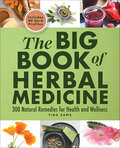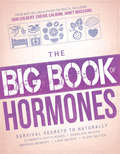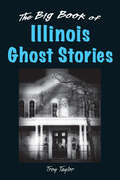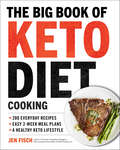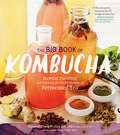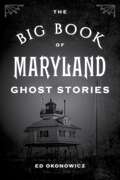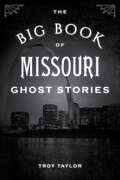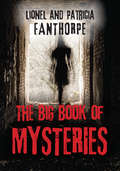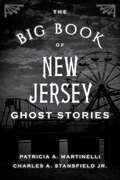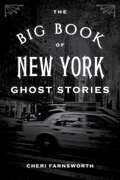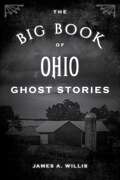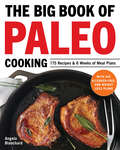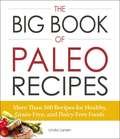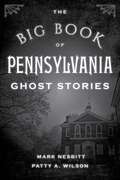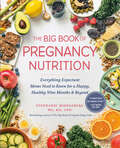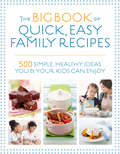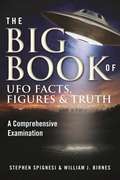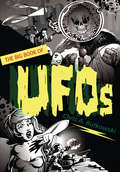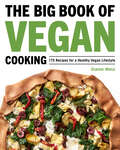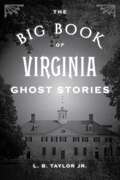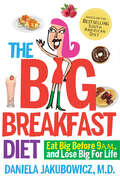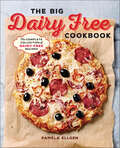- Table View
- List View
The Big Book of Herbal Medicine: 300 Natural Remedies for Health and Wellness
by Tina SamsHeal inside and out with the ultimate book of at-home herbal remediesBetter health and wellness can begin in your own backyard—literally. Discover the benefits of natural remedies with this complete guide to herbal medicine. You'll learn all about using the power of plants to heal yourself and your loved ones with homemade salves, balms, syrups, and teas—along with tips for growing and harvesting your own herbs!This is your go-to medicinal herb book:Start safe—Get a clear introduction to herbal medicine with information on how different herbs work, proper dosage, safe preparation, and even some of the fascinating history of herbs!300 herbal recipes—Use this book of natural remedies in all aspects of your health, with sections dedicated to physical ailments, mental health and wellness, as well as skin and beauty.From aloe to yarrow—Organize your home apothecary with easy-reference entries for 90 common herbs that each include a photo and a clear explanation of the herb's healing properties.Just a sampling of what's inside—Brew Hibiscus Tea to help lower blood pressure, Bergamot Smelling Salt to relieve stress, a Hyssop Deep-Cleansing Mask to clear your pores, and so much more.Unearth nature's healing remedies and improve your well-being with this natural medicine recipe book.
The Big Book of Hormones: Survival Secrets to Naturally Eliminate Hot Flashes, Regulate Your Moods, Improve Your Memory, Lose Weight, Sleep Better, and More!
by Siloam EditorsEnd the hormone roller coaster ride for good.Behind the scenes your hormones have played a huge role where your health and well-beingare concerned. So much depends on them, just as their functioning depends on many otheraspects of your life. Despite a woman&’s tendency to ruefully bemoan her hormones, God inventedhormones and He knew what He was doing. He designed their intricate dances within your body.He also designed your mind to be able to understand how to live in and maintain a healthy body.Using the wealth of resources from Siloam&’s most popular health writers, including Janet Maccaro,Don Colbert, Reginald Cherry, Cherie Calbom, and Scott Farhart, The Big Book of Hormonesis a comprehensive book on women&’s hormone health that covers topics such as antiaging,weight loss, natural health (supplements, vitamins, superfoods, smoothies, and juices), stressmanagement, and more.WOMEN WILL LEARN:HOW TO IDENTIFY HORMONE IMBALANCESTHE BEST PROTOCOLS FOR RESTORATION, WEIGHT LOSS, SLEEP, MEMORY RECALL AND REGULATING MOOD SWINGSHOW TO PREVENT OTHER DISEASES RELATED TO HORMONE DEPLETION SUCH AS HEART DISEASE, OSTEOPOROSIS, CERTAIN CANCERS, AND MORE!
The Big Book of Illinois Ghost Stories (Big Book of Ghost Stories)
by Troy TaylorMore than 100 stories from haunted locales across the Prairie State. Compiled by Illinois's best-known author on the paranormal, Troy Taylor.
The Big Book of Infectious Disease Trivia: Everything You Ever Wanted to Know about the World's Worst Pandemics, Epidemics and Diseases
by Kristina WrightFacts, myths, statistics, science, and history about communicable illnesses from around the world that will have you equally freaked out and fascinated. Taking a friendly approach to a serious subject, The Big Book of Infectious Disease Trivia answers your questions about pandemics, epidemics, and diseases—and covers the bizarre questions you never thought to ask. From familiar diseases like influenza to ancient diseases like leprosy to oddly named diseases like mad cow disease, this book tackles the mind-blowing facts and obscure details about many infectious diseases—past, present, and future. Get ready to broaden your understanding of humanity&’s many illnesses, from survivable to deadly, with answers to questions like: What&’s the difference between an epidemic and a pandemic? What is the oldest known infectious disease? How is COVID-19 different from the flu and pneumonia? Who invented the face mask? What is herd immunity? What does it take to have an infectious disease declared &“eradicated"? With historical facts along with pop culture references, The Big Book of Infectious Disease Trivia is a must-have for anyone fascinated by infectious diseases.
The Big Book of Keto Diet Cooking: 200 Everyday Recipes and Easy 2-Week Meal Plans for a Healthy Keto Lifestyle
by Jen Fisch200 recipes, meal plans, and more—everything you need to go keto.The biggest thing to happen to the ketogenic diet since fat bombs, The Big Book of Ketogenic Diet Cooking is an unmatched reference with the largest collection of recipes and meal plans yet for keeping up with the ketogenic diet.For beginners and seasoned ketogenic dieters alike, The Big Book of Ketogenic Diet Cooking offers an essential introduction to the ketogenic diet, plus 2-week meal plans that target your individual weight loss goals and kick-start ketosis. Complete with 200 tasty recipes, The Big Book of Ketogenic Diet Cooking includes everything you need for a lifetime on the ketogenic diet.The Big Book of Ketogenic Diet Cooking is the only book that fills the needs of every keto kitchen with:200 simple, everyday ketogenic diet recipes that are both practical and satisfying for breakfast, lunch, dinner, dessert and more3 meal plans customized to fit your specific needs that are designed to encourage weight loss and take the guesswork out of choosing what to eatAn informative overview of ketogenic diet cooking that will help you prep your pantry and understand the basics of ketoHelpful advice and quick tips for adopting and maintaining a healthy ketogenic diet lifestyleGo big on keto with recipes, guidance, meal plans, nutritional information, tips and tricks from The Big Book of Ketogenic Diet Cooking.
The Big Book of Kombucha: Brewing, Flavoring, and Enjoying the Health Benefits of Fermented Tea
by Hannah Crum Alex LaGory2016 Silver Nautilus Book Award Winner Brew your own kombucha at home! With more than 400 recipes, including 268 unique flavor combinations, you can get exactly the taste you want — for a fraction of the store-bought price. This complete guide, from the proprietors of Kombucha Kamp, shows you how to do it from start to finish, with illustrated step-by-step instructions and troubleshooting tips. The book also includes information on the many health benefits of kombucha, fascinating details of the drink&’s history, and recipes for delicious foods and drinks you can make with kombucha (including some irresistible cocktails!). &“This is the one go-to resource for all things kombucha.&” — Andrew Zimmern, James Beard Award–winning author and host of Travel Channel&’s Bizarre Foods
The Big Book of Maryland Ghost Stories
by Ed OkonowiczHauntings lurk and spirits linger in the Old Line StateReader, beware! Turn these pages and enter the world of the paranormal, where ghosts and ghouls alike creep just out of sight. Author Ed Okonowicz shines a light in the dark corners of Maryland and scares those spirits out of hiding in this thrilling collection. From footsteps and apparitions appearing at Fort McHenry, to reports of strange noises and phenomena at the battleground of Antietam, these stories of strange occurrences will keep you glued to the edge of your seat. Around the campfire or tucked away on a dark and stormy night, this big book of ghost stories is a hauntingly good read.
The Big Book of Missouri Ghost Stories
by Troy TaylorHauntings lurk and spirits linger in the Show Me StateReader, beware! Turn these pages and enter the world of the paranormal, where ghosts and ghouls alike creep just out of sight. Author Troy Taylor shines a light in the dark corners of Missouri and scares those spirits out of hiding in this thrilling collection. From a headless ghost who stalks the aptly named &“Murder Rocks&”, to a large hairy monster that roams the banks of the Missouri River, there&’s no shortage of bone-chilling tales to keep you up at night. It&’s even rumored that the devil himself came to St. Louis in 1949, but nobody knows for sure if he ever left. Around the campfire or tucked away on a dark and stormy night, this big book of ghost stories is a hauntingly good read.
The Big Book of Mysteries
by Lionel And FanthorpeFrom Atlantis to Nostradamus, Masons to Templars, Lionel and Patricia Fanthorpe have explored some of the greatest mysteries ever known in this world and beyond. Now, in The Big Book of Mysteries, the Fanthorpes attempt to answer, among other questions: What are the origins of blood-sucking creatures such as vampires? Do Yeti and Sasquatch truly exist on mountains in Canada and Nepal? Who actually built the Sphinx and the Pyramids and why were they erected? What strange, dangerous powers lay hidden in the Ark of the Covenant? Is the Bermuda Triangle really a deathtrap for ships and planes? Secret societies, lost treasures, and legendary monsters all have been carefully researched by the Fanthorpes, many investigated in person, and now presented with illustrations and photographs in one super-sized collection to satisfy everyones curiosity. If youve ever felt the burning desire to know more about lifes great mysteries, then The Big Book of Mysteries is for you no element of the unknown is safe from the Fanthorpes scrutinizing eyes.
The Big Book of New Jersey Ghost Stories
by Patricia A. Martinelli Charles A. Stansfield Jr.Hauntings lurk and spirits linger in the Garden StateReader, beware! Turn these pages and enter the world of the paranormal, where ghosts and ghouls alike creep just out of sight. Authors Patricia A. Martinelli and Charles A. Stansfield Jr. shine a light in the dark corners of New Jersey and scare those spirits out of hiding in this thrilling collection. From what may lurk in the Ramapo Mountains, to a ghostly little boy who waits on Clinton Road, and the fabled Jersey Devil itself, these stories of strange occurrences will keep you glued to the edge of your seat. Around the campfire or tucked away on a dark and stormy night, this big book of ghost stories is a hauntingly good read.
The Big Book of New York Ghost Stories
by Cheri FarnsworthHauntings lurk and spirits linger in the Empire StateReader, beware! Turn these pages and enter the world of the paranormal, where ghosts and ghouls alike creep just out of sight. Author Cheri Farnsworthshines a light in the dark corners of New York and scares those spirits out of hiding in this thrilling collection. From apparitions and objects that fly off of tables at the Manhattan Bistro, to a specter that stalks Pulpit Rock in Lake Placid, there&’s no shortage of bone-chilling tales to keep you up at night. Around the campfire or tucked away on a dark and stormy night, this big book of ghost stories is a hauntingly good read.
The Big Book of Ohio Ghost Stories (Big Book of Ghost Stories)
by James A. WillisHauntings lurk and spirits linger in the heart of America Reader, beware! Turn these pages and enter the world of the paranormal, where ghosts and ghouls alike creep just out of sight. Author James A. Willis shines a light in the dark corners of Ohio and scares those spirits out of hiding in this thrilling collection. From ghostly soldiers that still haunt Fort Meigs to the eerie Franklin Castle, there&’s no shortage of bone-chilling tales to keep you up at night. There&’s even a carved tombstone of an infant at Cedar Hill cemetery, whose ghostly eyes keep watch over those wander too close. Around the campfire or tucked away on a dark and stormy night, this big book of ghost stories is a hauntingly good read.
The Big Book of Paleo Cooking: 175 Recipes & 6 Weeks of Meal Plans
by Angela BlanchardEverything you need to go paleo—175 delicious recipes to transform your diet Millions of years ago, humans subsisted by hunting their food. We may not chase down woolly mammoths nowadays, but paleo eating is still vital. The Big Book of Paleo Cooking delivers 175 mouthwatering, paleo-centric recipes and 6 weeks of meal plans, providing a low-carb dietary road map that can help promote weight loss and boost energy. The core of paleo cooking remains timeless—fresh proteins, nuts and seeds, and unprocessed fruits and vegetables. Not only will you eat healthier, but you'll be kicking wheat and dairy, conquering food allergies, and addressing autoimmune disorders while feeling fully satisfied. The Big Book of Paleo Cooking includes: Plenty of options—These paleo recipes span every meal and include snacks, beverages, and sauces. Customized control—Choose from 6 weeks worth of meal plans to address weight loss, live allergen-free, and eat autoimmune-safe. Tasty substitutions—Discover replacement ingredients and kitchen tips to help you incorporate paleo-friendly foods. When you're ready to switch to a new lifestyle, this paleo cookbook will show you how.
The Big Book of Paleo Recipes
by Linda LarsenHundreds of delicious, grain-, gluten-, and dairy-free recipes! Butternut Squash Soup. Coconut Shrimp. Dark Chocolate Brownies. The Big Book of Paleo Recipes shows you how to create hundreds of flavorful paleo meals that keep you feeling full throughout the day. From hearty breakfast staples to satisfying entrees to mouthwatering desserts, each recipe uses fresh, paleo-approved ingredients, so you never have to worry about what's on your plate. With more than 500 paleo dishes to choose from, you will keep your family happy and healthy with easy-to-make recipes like: Sausage Egg Bake Buffalo Chicken Wings Apples-and-Onions Pork Chops Ginger-Lime Salmon Apple Cranberry Crisp Complete with step-by-step instructions and plenty of preparation tips, The Big Book of Paleo Recipes has everything you need to make grain-, gluten-, and dairy-free meals in no time!
The Big Book of Paleo Recipes: More Than 500 Recipes for Healthy, Grain-Free, and Dairy-Free Foods
by Linda LarsenHundreds of delicious, grain-, gluten-, and dairy-free recipes!Butternut Squash Soup. Coconut Shrimp. Dark Chocolate Brownies.The Big Book of Paleo Recipes shows you how to create hundreds of flavorful paleo meals that keep you feeling full throughout the day. From hearty breakfast staples to satisfying entrees to mouthwatering desserts, each recipe uses fresh, paleo-approved ingredients, so you never have to worry about what's on your plate. With more than 500 paleo dishes to choose from, you will keep your family happy and healthy with easy-to-make recipes like:Sausage Egg BakeBuffalo Chicken WingsApples-and-Onions Pork ChopsGinger-Lime SalmonApple Cranberry Crisp Complete with step-by-step instructions and plenty of preparation tips, The Big Book of Paleo Recipes has everything you need to make grain-, gluten-, and dairy-free meals in no time!
The Big Book of Pennsylvania Ghost Stories
by Mark Nesbitt Patty A. WilsonHauntings lurk and spirits linger in the Keystone StateReader, beware! Turn these pages and enter the world of the paranormal, where ghosts and ghouls alike creep just out of sight. Authors Mark Nesbitt and Patty A. Wilson shine a light in the dark corners of Pennsylvania and scare those spirits out of hiding in this thrilling collection. From apparitions of fires and soldiers struggling in the cold at Valley Forge, to ghostly children stalking dormitories at Gettysburg College, these stories of strange occurrences are sure to send a chill up your spine. Around the campfire or tucked away on a dark and stormy night, this big book of ghost stories is a hauntingly good read.
The Big Book of Pregnancy Nutrition: Everything Expectant Moms Need to Know for a Happy, Healthy Nine Months and Beyond
by Stephanie MiddlebergThe only guide you need to nourishing yourself and your baby from the first through fourth trimesters, from the bestselling author of The Big Book of Organic Baby FoodWhen you found out you were pregnant, you were probably given a long list of things you were no longer &“supposed&” to do. But what you really need is a practical guide to all the things you can do to feel as empowered and strong as possible. The Big Book of Pregnancy Nutrition is the comprehensive handbook to everything a mama-to-be needs to feel healthy and supported for her entire pregnancy—and beyond—from licensed nutritionist, registered dietitian, and mom-of-two Stephanie Middleberg.This one-of-a-kind resource covers everything from prenatal vitamins and supplements to foods that alleviate constipation and heartburn to preparing for your glucose test and what to cook and freeze before the baby comes. Learn which foods may help your baby&’s developing microbiome, decrease nausea, ease labor pains, and build your milk supply.Inside, you&’ll find more than forty delicious, easy, nutritious recipes to fit any preference, including:roasted red pepper and asparagus frittatabutternut squash and apple soupmiso salmon with bok choylemon coconut energy biteschocolate chip lactation cookiesPregnancy can be hard, but with Middleberg&’s expert guidance, you will find that fueling yourself and your growing baby doesn&’t have to be.
The Big Book of Quick, Easy Family Recipes: 500 simple, healthy ideas you and your kids can enjoy
by Nicola Graimes Christine Bailey Kirsten Hartvig Charlotte Watts Gemini AdamsThe Big Book of Quick, Easy Family Recipes is packed with easy, delicious meals that kids love to eat, and parents feel great about serving. Each recipe is either quick to prepare, or allows you to pop it in the oven and get on with something else, so stressful meal prep is a thing the past. With over 500 recipes, you can find brilliant options for every meal of the day. It is broken down into easy-to-use chapters: • Breakfasts • Soups and Salads • Lunches • Dinners • Desserts • Snacks • DrinksWith dedicated storage instructions (so you can make the most of your leftovers), batch cooking suggestions and detailed preparation and cooking times, it has never been easier to cook healthy for the whole family.
The Big Book of Texas Ghost Stories
by Alan BrownHauntings lurk and spirits linger in the Lone Star StateReader, beware! Turn these pages and enter the world of the paranormal, where ghosts and ghouls alike creep just out of sight. Author Alan Brown shines a light in the dark corners of Texas and scares those spirits out of hiding in this thrilling collection. From tales of haunted hotels like the Von Minden and The Beckham, to a creek where a woman&’s screams can still be heard to this day, and the shadowy figures still stalking the Alamo, these stories of strange occurrences will keep you glued to the edge of your seat. Around the campfire or tucked away on a dark and stormy night, this big book of ghost stories is a hauntingly good read.
The Big Book of UFO Facts, Figures & Truth: A Comprehensive Examination
by William J. Birnes Stephen SpignesiIn a mothership full of entertaining and informative chapters, authors Stephen Spignesi and William Birnes, writers of many books dealing with the intriguing, weird, and unexplained, shed a revealing beam of light on the UFO phenomenon. From inexplicable cattle mutilations and modern astronauts who have seen UFOs, to close encounters of the third and fourth kind, and, it’s all here: The latest on Roswell, and the 1947 crash that has never been explainedThe weirdest (and most convincing) alien abductions—and the medical procedures performed on abducteesThe most commonly-seen UFO shapesA who's who of UFOlogy—including presidents that have seen UFOsUFOs and the Bible20 years of Project Blue Book mysteries—NASA’s official UFO investigationWeirdness galore—Men in Black, crop circles, Bigfoot, the face on Mars, Hollow Earth Theory, alien ancestry, and more!The Big Book of UFO Facts, Figures & Truth is at once a valuable reference and an engrossing guide for all those fascinated with unexplained phenomenon. Turning to any page at random, readers are sure to find new facts and information, as well as dozens of rare, irrefutable photos. In addition, readers will learn how they can access a special website which includes actual video evidence of UFOs. This just may be the most comprehensive UFO guide available.
The Big Book of UFOs
by Chris A. RutkowskiChris Rutkowskis name is synonymous with UFO research the world over, and this book captures his most breathtaking research, along with new and exciting accounts, that will have you questioning "are we alone in the universe?" The Big Book of UFOs is a compendium of his best and most disturbing UFO stories for enthusiastic fans everywhere, with startling evidence to make even the biggest skeptics believe. The renowned ufologist takes us on a tour of UFOs in Canada and around the world. He has studied UFOs, aliens, abductions, and even encounters reported by kids. Rutkowski offers many famous reports, such as the "ghost airplanes" seen over Canadas Parliament in 1915, but also includes many exciting new cases, secret files, and statistics, as well as lots of tidbits and trivia to keep everyone excited.
The Big Book of Vegan Cooking: 175 Recipes for a Healthy Vegan Lifestyle
by Dianne WenzThe complete cookbook of vibrant vegan recipes for every occasion Vegan food is so much more than salad—you just need the right recipes to bring your healthy lifestyle to life. This standout among vegan cookbooks has a plethora of plant-based dishes to keep your meals exciting, ranging from vegan twists on comfort food favorites to creative innovations. Whether you're vegan-curious or a seasoned veteran, you'll find options for every meal of the day, plus snacks and sweets. Even those salads get an upgrade! This distinctive choice in vegan cookbooks includes 175 delicious dishes, like Baked Avocado Fries, Buffalo Cauliflower Pizza, Lemon Asparagus Risotto, Chocolate Tahini Brownies, and much more. Vegan essentials—Brush up on the basics of a plant-based diet, get advice for pantry and kitchen staples, find nutrition guidance, and learn plenty of tips and tricks. Simple, flexible recipes—Find the perfect dish for your needs with handy labels for 30-minute meals, one-pot/pan recipes, and kid-friendly choices the whole family can enjoy. At-a-glance dietary info—Each of the recipes in this plant-based cookbook includes nutritional facts, and the allergy-friendly lineup includes many nut-, gluten-, and soy-free options. Find your new favorite recipe in this complete vegan cookbook.
The Big Book of Virginia Ghost Stories
by L. B. Taylor Jr.Hauntings lurk and spirits linger in the Old Dominion StateReader, beware! Turn these pages and enter the world of the paranormal, where ghosts and ghouls alike creep just out of sight. Author L. B. Taylor shines a light in the dark corners of Virginia and scares those spirits out of hiding in this thrilling collection. From poltergeists that make trouble at Blue Ridge Pottery, to a phantom light on Holston Mountain, to specters haunting the battlefield of Cedar Creek, there&’s no shortage of bone-chilling tales to keep you up at night. Around the campfire or tucked away on a dark and stormy night, this big book of ghost stories is a hauntingly good read.
The Big Breakfast Diet: Eat Big Before 9 A.m., And Lose Big For Life
by Daniela Jakubowicz<P>Eat a huge breakfast, lose a lot of weight? It sounds counter-intuitive, but when a clinical professor of endocrinology and metabolic disease advocates it, maybe it's worth considering. And when that same clinical professor offers proof that overweight women lost nearly five times more weight on a breakfast cure diet than their counterparts did on a low-carb diet, it's time to pay attention. <P>Dr. Daniela Jakubowicz, a clinical professor at Virginia Commonwealth University and the Hospital de Clinicas Caracas in Venezuela, originally published her diet book in Venezuela and it became a South American bestseller, selling 300,000 copies. Now after continued research, Dr. Jakubowicz presents The Big Breakfast Diet, with its promise that you can have all the foods you crave, from pasta to bacon to ice cream, with just one catch—you have to eat them before 9:00 A.M. Based on the body's natural rhythms, eating a big, complete breakfast revs up your metabolism; helps burn more calories during the day and more fat at night; satisfies hunger all day long; boosts your energy; eliminates cravings for sweets; and reduces the risk of serious health conditions like type 2 diabetes and heart disease. <P>After explaining the science behind the diet, and how the body's hormones and metabolism process food differently depending on what time of day you eat, The Big Breakfast Diet centers around a full 28-day meal plan—breakfast, lunch, dinner, and snacks, plus recipes. The day begins with a big breakfast—a smoothie or shake, pancakes with berry syrup and ricotta cheese, Canadian bacon, a breakfast sweet—and ends with a moderate, delicious dinner.
The Big Dairy Free Cookbook: The Complete Collection of Dairy Free Recipes
by Pamela EllgenGiving up dairy doesn't mean giving up your favorite foods. See for yourself how easy and enjoyable dairy free can really be with 150+ recipes in The Big Dairy Free Cookbook.Most of us don't realize how much dairy we consume until faced with eliminating it from our diet—and successful dairy free recipes require more than just swapping out the milk, butter, cheeses, or creams. With The Big Dairy Free Cookbook you'll learn how to prepare dairy free versions of your favorite dishes without losing the delicious flavors and textures you love.More than 150 recipes take a fresh approach to eating dairy free so you can enjoy favorites such as Mac 'n' Cheese and Spinach-Artichoke Dip, as well as creative dishes like Pistachio and Herb "Goat" CheeseEasy-to-understand guidance explains what it means to go "dairy free" without getting overly complicated or scientificInnovative meal-making tips for preparing dairy free dishes from around the world, as well as options for cooking with other food allergies in mindWhether you're allergic to milk, lactose intolerant, or food sensitive, The Big Dairy Free Cookbook will make dairy free living simple, stress-free, and absolutely delicious.
